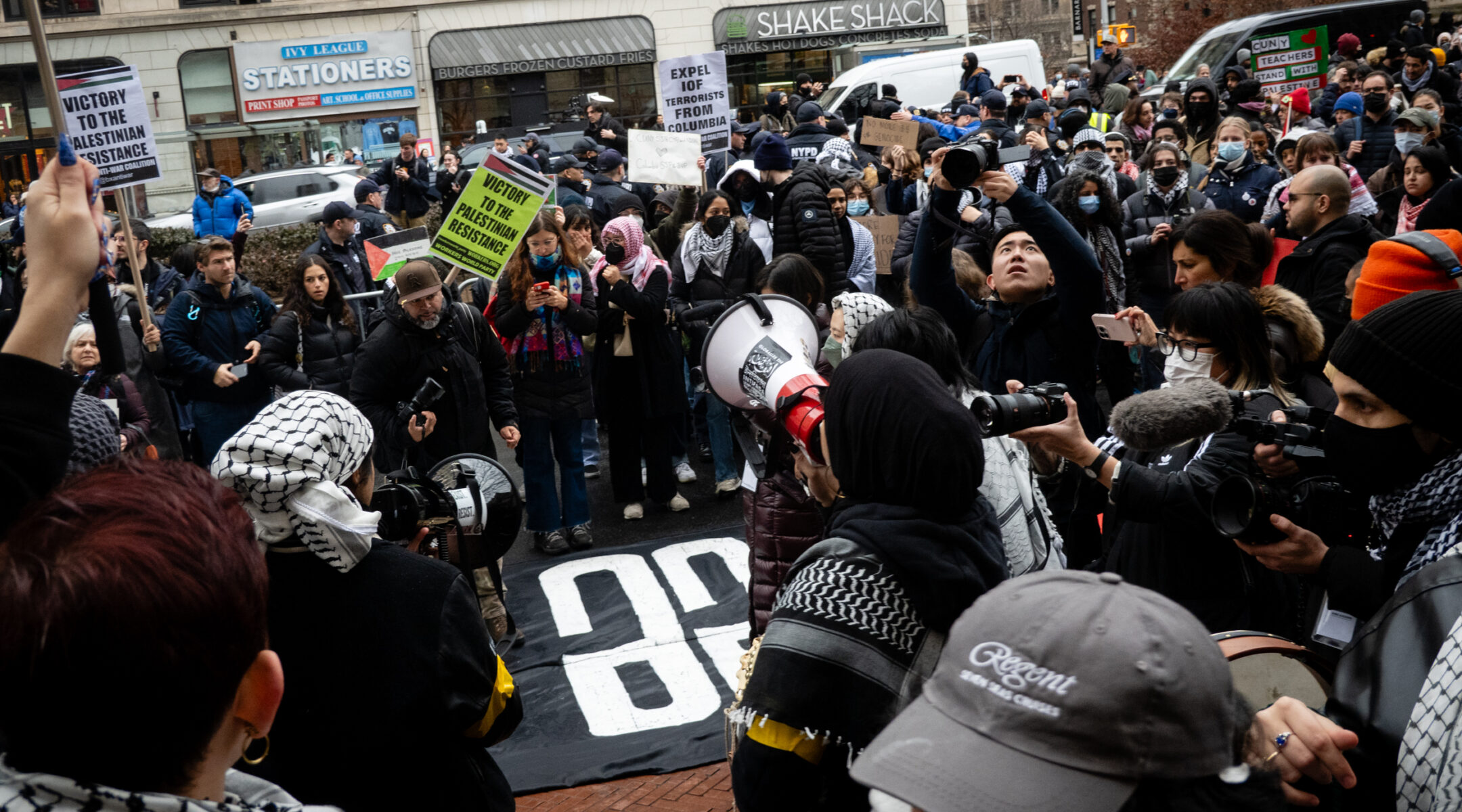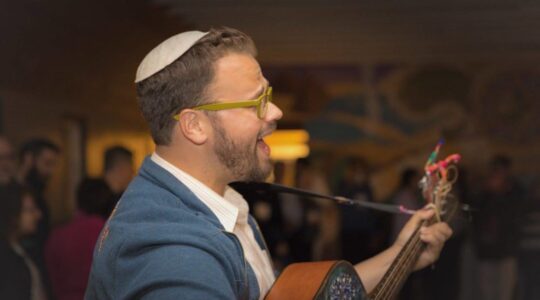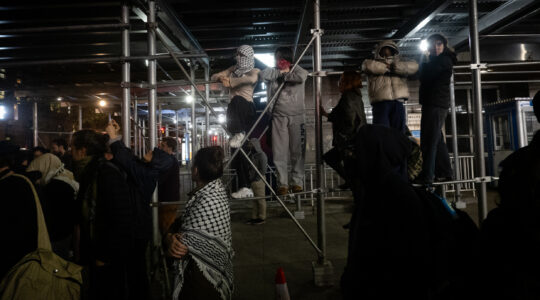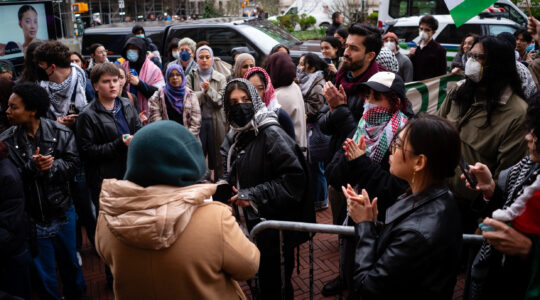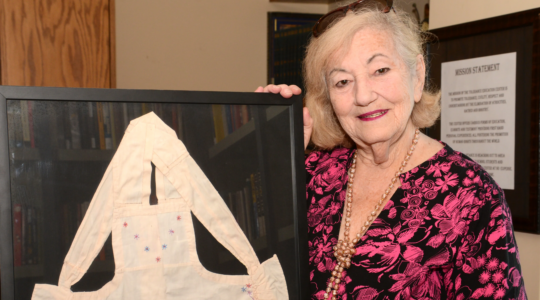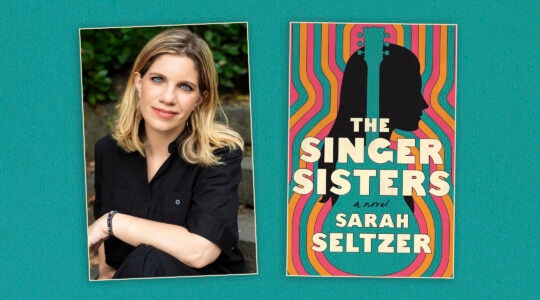Columbia University administrators said Jewish students occupied a “place of privilege,” called a Hillel official a “problem” and wrote “Amazing what $$$$ can do,” during a panel on Jewish campus life in May, newly released text messages showed.
Columbia had already suspended three of the four administrators involved after photos of some of the texts were first published last month. Now, the House Committee on Education and the Workforce, which is investigating antisemitism at Columbia and other campuses, has obtained and released the full text message exchanges.
While elements of the text messages have been previously reported, the full exchanges show the university officials downplaying students’ concerns about antisemitism, bashing the head of the school’s Hillel and suggesting that Jewish students received attention because of money.
The conversations were conducted while the administrators were attending a May 31 panel discussion titled “Jewish Life on Campus: Past, Present, and Future.”
“Comes from such a place of privilege,” wrote Susan Chang-Kim, the university’s vice dean and chief administrative officer. “Hard to hear the woe is me, we need to huddle at the Kraft Center,” Columbia’s Jewish student center, where Hillel is housed.
“Yup. Blind to the idea that non-Israel supporting Jews have no space to come together,” responded Cristen Kromm, a dean of undergraduate student life.
“If only every identity community had these resources and support,” Kromm added several minutes later.
The new texts also shed light on a previously reported exchange between Kromm and Chang-Kim, which the House committee said was about an October op-ed by Hillel Rabbi Yonah Hain on campus antisemitism, titled “Sounding the alarm.”
“And we thought Yonah sounded the alarm,” Kromm wrote near the end of the exchange, followed by two vomit emojis.
“I’m going to throw up,” Chang-Kim responded.
“Amazing what $$$$ can do,” Kromm said at one point, apparently when Brian Cohen, the executive director of Columbia’s Hillel, was speaking about students receiving attention in the media and in Washington, D.C.
At another point while Cohen was speaking, Chang-Kim wrote, “He is such a problem!”
Support the New York Jewish Week
Our nonprofit newsroom depends on readers like you. Make a donation now to support independent Jewish journalism in New York.
“Painting our students as dangerous,” she added.
“He knows exactly what he’s doing and has to take full advantage of this moment. Huge fundraising potential,” said Matthew Patashnick, an associate vice dean for student and family support, in one of the messages reported last month.
At other points in the exchange, which lasted for close to two hours, Chang-Kim wrote “Smoke and mirrors,” and “Trying to be open minded to understand but the doors are closing.”
In another text shared with the New York Jewish Week last month, Chang-Kim texted Josef Sorett, the university’s dean, while Cohen was speaking. “He is our hero,” Chang-Kim said, in an apparently sarcastic message. Nine minutes later, Sorett wrote, “Lmao,” an acronym for “laughing my ass off.” It was unclear whether his text was a delayed response to Chang-Kim or whether he was reacting to something else. He did not respond to a request for comment.
In addition to Cohen, the panelists were former law school Dean David Schizer, who co-chairs the university’s antisemitism task force; Rebecca Massel, a student journalist for the Columbia Spectator, the campus newspaper; and Ian Rottenberg, the director of the school’s Center for Religious Life.
An audience member sitting behind one of the deans took photos of the administrators’ texts and first shared them last month with the Washington Free Beacon, a conservative news outlet that has reported aggressively about the incident and its fallout.
The university suspended Chang-Kim, Kromm and Patashnick last month after the texts came to light.
The university said on Tuesday that Sorett would remain in his position as the dean of the college, but would be recused from all matters relating to the investigation into the texts. Sorett was cooperating with the investigation, and had told his team that the other three administrators had been placed on leave pending the probe, a Columbia official told the New York Jewish Week.
“We are committed to combatting antisemitism and taking sustained, concrete action to ensure Columbia is a campus where Jewish students and everyone in our community feels safe, valued, and able to thrive,” the official said. “The Dean reiterated his commitment to learning from this situation and other incidents over the last year to build a community of respect and healthy dialogue.”
The House committee that released the transcript of the texts has gained global attention in recent months for holding explosive hearings on campus antisemitism with the leaders of several elite universities. It has vowed to keep pressing the issue.
“Jewish students deserve better than to have harassment and threats against them dismissed as ‘privilege,’ and Jewish faculty members deserve better than to be mocked by their colleagues,” said the committee chairwoman, Virginia Foxx, in a Tuesday statement. “These text messages once again confirm the need for serious accountability across Columbia’s campus.”
The suspensions come as Columbia continues to grapple with months of antisemitism allegations on campus following Hamas’ Oct. 7 attack on Israel and the ensuing war in Gaza.
Support the New York Jewish Week
Our nonprofit newsroom depends on readers like you. Make a donation now to support independent Jewish journalism in New York.
The school gained worldwide attention in April when pro-Palestinian students set up an encampment that sparked a nationwide movement and, critics said, created a hostile and threatening environment for Jewish students. More than 100 students were arrested at the encampment and subsequently during activists’ takeover of a campus building. Soon afterward, the school canceled its main commencement ceremony.
The campus is quieter now that classes have ended, but the school’s antisemitism task force, set up in the weeks after Oct. 7, is due to release a report about incidents in which Jewish students were targeted.
Student protesters, meanwhile, have vowed to keep demonstrating even as classes have let out. Student groups around the city last month, including at Columbia, declared a “Summer of Resistance,” urging followers to take “non-stop action” in the coming months.
